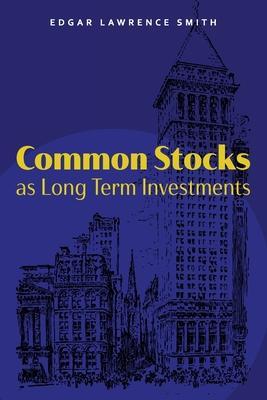Common Stocks as Long Term Investments

Common Stocks as Long Term Investments
Smith himself held that view, before beginning the research for this book. As he told his Harvard class at their 50th reunion, "I tried to write a pamphlet on why bonds were the best form of long term investment. But supporting evidence for this thesis could not be found."
Edgar Lawrence Smith (b. 1882, d. 1971) was a Harvard-educated economist and investment manager. While working as an advisor to the brokerage firm Low, Dixon & Company, he began to look at the relative performance of bonds versus stocks.
Through 11 case studies completed for Common Stocks as Long Term Investments, Smith proved that the prevailing wisdom in favor of bonds over stocks was wrong. In 10 out of the 11 cases, a $10,000 investment in arbitrarily chosen stocks would have outperformed an equal investment in high-grade bonds. And in the 11th case, the lower return was impacted by two market panics and inflation (in the years 1866-1885).
How does Smith account for the better performance of stocks over time? To begin, stocks often grow with or even in excess of inflation. Returns on bonds, on the other hand, lose purchasing power over time due to inflation. In addition, the general march of progress through population growth and improved standards of living over time leads to greater demand for products and services. The trajectory of progress often leads to growth that outpaces inflation, making stocks a better long-term investment.
Smith's work supports a long-term investment strategy. He shows that over 15 years, the value of stocks sees a loss only 1.1% of the time. While they may be subject to short-term fluctuations, their long-term reliability makes them a smart investment as part of a balanced portfolio. Smith does not advocate against bonds. He merely suggests that investors give heavier weight to stocks than bonds, rather than the other way around.
Famous economists Irving Fisher and John Maynard Keynes praised the book. Keynes invited Smith to joi
PRP: 101.49 Lei
Acesta este Prețul Recomandat de Producător. Prețul de vânzare al produsului este afișat mai jos.
91.34Lei
91.34Lei
101.49 LeiLivrare in 2-4 saptamani
Descrierea produsului
Smith himself held that view, before beginning the research for this book. As he told his Harvard class at their 50th reunion, "I tried to write a pamphlet on why bonds were the best form of long term investment. But supporting evidence for this thesis could not be found."
Edgar Lawrence Smith (b. 1882, d. 1971) was a Harvard-educated economist and investment manager. While working as an advisor to the brokerage firm Low, Dixon & Company, he began to look at the relative performance of bonds versus stocks.
Through 11 case studies completed for Common Stocks as Long Term Investments, Smith proved that the prevailing wisdom in favor of bonds over stocks was wrong. In 10 out of the 11 cases, a $10,000 investment in arbitrarily chosen stocks would have outperformed an equal investment in high-grade bonds. And in the 11th case, the lower return was impacted by two market panics and inflation (in the years 1866-1885).
How does Smith account for the better performance of stocks over time? To begin, stocks often grow with or even in excess of inflation. Returns on bonds, on the other hand, lose purchasing power over time due to inflation. In addition, the general march of progress through population growth and improved standards of living over time leads to greater demand for products and services. The trajectory of progress often leads to growth that outpaces inflation, making stocks a better long-term investment.
Smith's work supports a long-term investment strategy. He shows that over 15 years, the value of stocks sees a loss only 1.1% of the time. While they may be subject to short-term fluctuations, their long-term reliability makes them a smart investment as part of a balanced portfolio. Smith does not advocate against bonds. He merely suggests that investors give heavier weight to stocks than bonds, rather than the other way around.
Famous economists Irving Fisher and John Maynard Keynes praised the book. Keynes invited Smith to joi
Detaliile produsului













